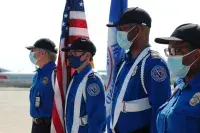
On Memorial Day weekend, many families gathered, had cookouts, stayed home and just enjoyed the company of those closest to them. For those who served this country, are serving, or plan to serve, Memorial Day has a close-to-home impact that helps give perspective on what is important.
Thomas Stein, who serves in the TSA Honor Guard at Baltimore/Washington International Thurgood Marshall Airport (BWI), will tell you every time he sees a fallen service member during a dignified transfer ceremony, it could easily have been him. Stein, a military veteran and Honor Guard member for 11 years, takes it upon himself and his team to perform dignified transfer ceremonies right.
The amount of respect and honor is so deserved; the pride of a lion couldn’t equal what Stein’s team gives to our fallen heroes and their families.
The preparation and practice for each dignified transfer, honoring the return of service members from the theater of operations where they died in service to the U.S., is specific to that individual event.
The TSA Honor Guard is asked to participate in three types of events – 9/11 ceremonies, individual memorial services or group services for those who have served or died on duty and at family request, and the dignified transfer of human remains for those who have fallen in military action.
“We, as TSA, understand there are people who want to hurt us – to destroy our way of life,” said Stein. “Members of the armed services are people who put their lives on the line to stand between us and those who want to do us harm. The least we should do is honor those who have given, as President Abraham Lincoln put it, the ‘last, full measure of devotion.’”
Rehearsals are imperative to have the exact look. Uniforms are specific to the Honor Guard, always pressed to impress. Specific movements are repeatedly practiced into muscle memory to have the exact order, because order is key to each movement. They proudly display the vibrant national colors to represent the American flag which shows honor and respect.
“A ritual such as a dignified transfer of human remains, a flag ceremony at a funeral, or an annual memorial service is a useful tool to assist mourners in their grief,” Stein added. “These services also give explicit permission to grieve. People who attend these services understand the purpose is to honor the loved ones and to allow the mourners to grieve openly in a place where they can receive much needed support.”
These selfless honorary presentations show respect to the fallen service members, their families and all loved ones, but especially to our flag, our country, our homeland.

